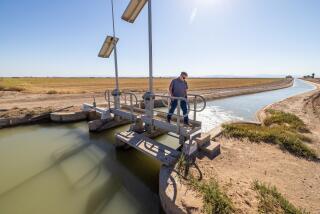Plan to Restore Mono Lake
- Share via
The state Water Resources Control Board, after exhaustive hearings and extensive study, has determined that to protect the Mono Basin’s unique environment there is need to cease exporting virtually all water from the basin for at least the next 20 years and raise the lake level another 17 feet (Sept. 18). The Los Angeles Department of Water and Power accepts that judgment and will not further appeal the board-recommended lake level.
The department must now heighten efforts already under way to replace the Mono Basin supply, which historically has represented almost 20% of the city’s supply. Toward that end, the department will continue to pursue its nationally recognized water conservation program, which has achieved 15% to 20% reduction in water usage during the past three years.
In addition, the department is moving as quickly as it can to take advantage of water reclamation and conservation opportunities in the legislation recently signed by the governor, which will provide $36 million of funding for projects in Los Angeles. The most important, the East Valley Water Recycling Project is being designed to provide 35,000 acre-feet per year of reclaimed water when it is running at full capacity.
The department wants to work closely with the many other interests in California that are grappling with the complex issues involved in making additional water supplies available to Southern California from the San Joaquin-Sacramento Delta, which will also require a new balancing between urban, agricultural and environmental interests under the guidance of the state Water Resources Control Board.
DENNIS A. TITO, President, DWP
*
In many ways, the most significant statement of the article is one which both sides can agree on. When referring to future water supplies in L.A., DWP’s James Wickser said that unused supply was to have accommodated anticipated population growth. It is an indisputable and objective fact that more people equals more consumption. This is in spite of the fact that comparatively small offsets can be made through advances in technology or conservation/reclamation/recycling. This applies for water as well as other resources including trees, roads, schools and many more.
As is the case with virtually any environmental issue, the real/underlying issue is population growth. Manage it properly and technology, conservation and recycling, etc., will have a chance to catch up and actually improve things. Fail to do so and the quality of life for all of this planet’s inhabitants is in big trouble.
FRANK BOHANAN, Fullerton
*
The Times seems to view Mono Lake’s protection as a loss for Los Angeles. This is not true for the following reasons. The Mono Lake Committee has worked very hard to get replacement water for L.A. that would not damage the environment. And Mono Lake is a place of great value that has meaning to the people of L.A.
In addition, Mono Lake is an important resource to the entire state. It is an important ecosystem as well as an important stop for migratory birds. This lake is very old and should be protected.
I live in Southern California and am willing to do my part and use less water to protect Mono Lake. There are state and federal funds available to help develop water reclamation and conservation programs in the Los Angeles Basin. These projects will create more water than the city ever diverted from Mono Basin, and the water created will be reliable, local and drought-proof.
PETER K. BISCHOFF, Agoura Hills
*
I am writing on behalf of the Mothers of East Los Angeles-Santa Isabel. This is a community-based organization that sponsors programs to help our community by creating jobs, expanding resources and fostering programs such as water conservation.
Reading your article, it seemed that Southern California is going to lose out if Mono Lake is protected. I believe that we are going to win. Our organization and eight groups in Southern California are doing our part to conserve enough water so that we can protect Mono Lake and still meet our water needs. Through our ultra-low flush toilet exchange program, we have conserved 6.5 billion gallons of water per year and added economic stimulus of $3 million into the inner city.
This past summer we took 25 inner-city children to camp at Mono Lake. Many of them had never had such an experience and Mono Lake’s natural beauty made a big impact on their lives. We all stand to gain if Mono Lake is protected.
ELSA LOPEZ, Los Angeles
More to Read
Sign up for Essential California
The most important California stories and recommendations in your inbox every morning.
You may occasionally receive promotional content from the Los Angeles Times.













